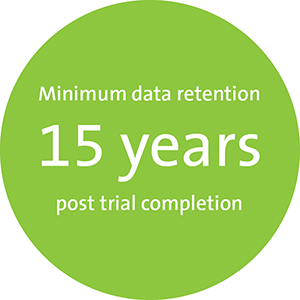






Researchers should be aware of and comply with any procedures and guidelines provided by their institution, including procedures for data storage and retention, see Melbourne Health: Data Storage and Security Guideline.
Essential documents must be stored throughout the trial and retained for a minimum period after the trial has finished.
Essential documents are all data and documents that permit evaluation of the conduct of the trial and the quality of the data. These include source documents, completed case report forms (CRFs) for each participant and the final datasets. For a more extensive list, refer to TGA: ICH Good Clinical Practice, Section 8.
The retention period for clinical trials depends on the applicable state, territory or national legislation. In accordance with the TGA: ICH Guideline for Good Clinical Practice, the minimum retention period is 15 years after the trial has finished.

However, for any trial, the retention period is also determined by the state or territory where data is collected, the age of participants and the type of research.
For example, Public Records Office of Victoria: Retention and Disposal Authority for Records of the High and Further Education Functions applies to research conducted by universities, research institutes and public hospitals and requires the records from clinical research involving minors be retained for 15 years after the participant reaches the age of 18, ie age 33. Records created from genetic research, including gene therapy, must be retained permanently.
Also there are additional considerations for retaining data collected from or about Aboriginal and Torres Strait Islander people. In accordance with the Australian Institute of Aboriginal and Torres Strait Islander Studies: Guidelines for Ethical Research in Australian Indigenous Studies, the use of, and access to, the results of research, including primary data should be agreed with Indigenous research participants.
Consideration should also be given to retaining data and information for use by future research projects, see Data Sharing for more information.
Source data that is a primary material (for example biological specimens, audio recordings of interviews) may not be practical to store long-term but durable records derived from them (such as test results and transcripts) should be retained and accessible.
Both the Sponsor-Investigator and all site Principal Investigators have responsibilities for managing essential documents before, during and after the trial. The Sponsor-Investigator’s repository for filing essential documents is called the Trial Master File (TMF). The Principal Investigator’s repository for filing is called the Investigator Site File (ISF).
The Sponsor-Investigator and site Principal Investigators should be aware of the responsibilities for maintaining essential documents in accordance with TGA: Guideline for Good Clinical Practice.
The Sponsor-Investigator and Site Principal Investigator are both responsible for the storage of data and documentation files during the study and the ensuing retention period.
Research data controlled by the Sponsor-Investigator and/or site Principal Investigator, should be stored in facilities provided by or approved by the host institution.
Note that cloud-based storage options like Dropbox are not recommended due to privacy and security concerns and they do not have user controls for back-up and restoration of files.
Research institutions should have a policy describing their responsibilities as data custodians for the security of and access to the data and information, address control or ownership of data facilities and archives in which data or information is stored. For an example standard operating procedure, refer to Melbourne Health: CRFs, Source Documents, Recording Keeping and Archiving.
Research data and the associated essential documents for the trial should be stored in a manner that includes:
The Data Management Plan should include any plans to destroy data, including all essential documents, at the end of the minimum retention period. This should be consistent with information provided in the study protocol and participant informed consent documents.
TGA: ICH Guideline for Good Clinical Practice
